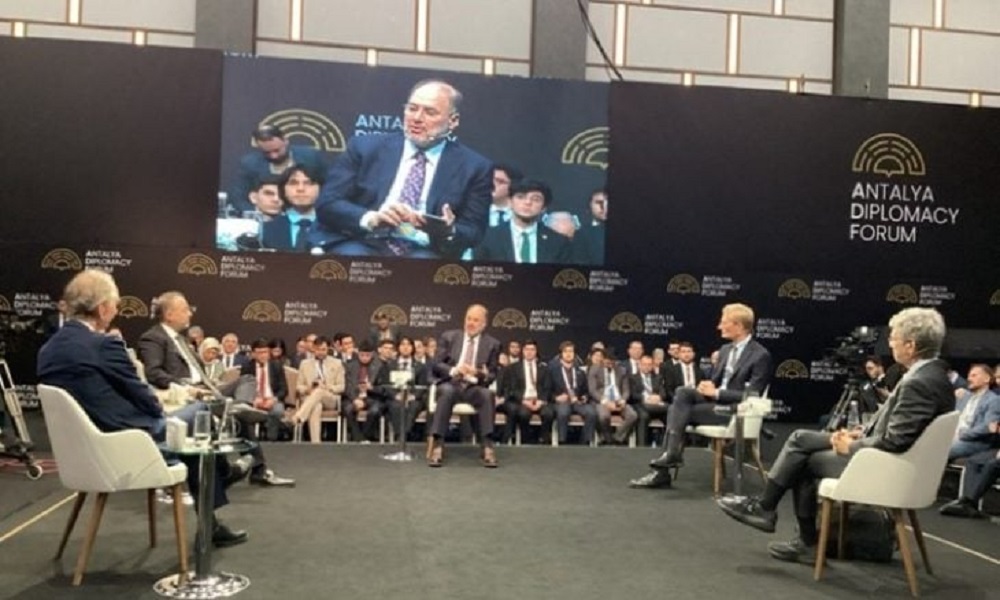Watan-Among the events that attracted significant attention at the 4th Antalya Diplomacy Forum was a seminar featuring Turkish Deputy Foreign Minister Nooh Yilmaz, the UN Special Envoy for Syria Geir Pedersen, Columbia University Professor of Sustainable Development and UN Sustainable Development Advisor Jeffrey Sachs, and the Deputy Executive Director of the World Food Program, Carl Skaar. The seminar was moderated by journalist Wadah Khanfar, former president of Al Jazeera News Channel and head of the Istanbul-based Forum of the East.
In his brief opening statement, Khanfar said: “Strategically, Syria is a geopolitical center. It is part of every conflict that has occurred in the region, and part of every solution as well,” emphasizing that Syria’s stability could reinvigorate hope across the wider Middle East. He mentioned that he had recently visited Damascus and felt a sense of optimism among the Syrian citizens, stating, “I saw the new hope that has emerged among the Syrian people.”
Khanfar asked the first question to Turkish Deputy Foreign Minister Yilmaz about his vision for how Syria could be stabilized, especially considering Azerbaijan’s role which began on Wednesday to explore Israel’s stance on the situation in Syria.

Turkish Deputy Minister Highlights Syria’s Geopolitical Challenges at Antalya Forum
The Turkish Deputy Minister started by commenting on the lack of Syrian representation among the speakers, stating that Syrian Foreign Minister, Asaad Al-Shabani, should have been among them, but he apologized due to the Syrian delegation having to return to Damascus.
Yilmaz discussed recent reports of “deconfliction talks” between Turkey and Israel in Azerbaijan regarding Syrian airspace, explaining that these talks were purely technical and not diplomatic. He stated: “It’s about a deconfliction mechanism; when you use airspace, you need to communicate with other active users of it.” However, Khanfar questioned the political consequences of continued Israeli strikes in Syria, saying: “If they continue, it means delegitimizing the current situation and putting Syria under immense pressure.”
Yilmaz acknowledged this issue, describing Israeli operations as “one of the greatest risks undermining the political legitimacy” of the new Syrian government. He warned, “Israeli expansion represents the biggest threat at the moment,” noting that the chaos on the ground could be exploited to justify Israel’s continued presence in Syria.
Pedersen: We Want Syria to Succeed
The conversation then shifted to Geir Pedersen, the UN Special Envoy for Syria, who urged the transitional government to be patient and accountable as Syria attempts a fragile transition under President Shara. He mentioned that developments in Syria had surprised everyone, but immediately the international community gathered in Aqaba, Jordan, with Western and Arab countries participating, while Russia, China, and Iran were absent from the conference.
Pedersen emphasized the importance of inclusive governance, saying: “If Shara fulfills his promises, including an inclusive governance structure and the preservation of state institutions, the international community will fulfill its promises,” citing improvements such as the new constitutional declaration and the creation of an inclusive government framework. He added that the issue of sanctions was undermining hope and economic recovery, agreeing with all speakers that international sanctions remain a significant obstacle to Syria’s reconstruction. Khanfar interjected, stating: “Honestly, sanctions are killing people,” reminding how ordinary Syrians who once relied on informal trade now struggle to obtain basic supplies.
Pedersen affirmed this concern, saying: “Without lifting sanctions, the country is heading toward disaster. The economic and humanitarian situation is worsening, and Washington is hesitant… it has not made a decision yet.” He pointed out that humanitarian aid is supposed to be exempt from sanctions and urged Turkey, the EU, and Arab countries to pressure the United States to allow it. He said, “We cannot afford failure. We need Syria to succeed.”
Sachs: The Blame Lies with the United States
Columbia University scholar Jeffrey Sachs sharply criticized U.S. and Israeli policies in the Middle East, stating that both countries continue to exploit the war in Syria. He said, “We will not have peace in this region unless we have public diplomacy based on real diplomacy, not on CIA operations.” He confirmed that the U.S. intelligence agencies had made the decision to overthrow Bashar al-Assad under instructions from the Israeli Mossad.
Sachs emphasized that the U.S. and Israel had pursued a long-term strategy to reshape the Middle East through military interventions and regime-change wars. He stressed that the “Syrian war is just one of six wars promoted by Israel, including those in Lebanon, Iraq, Syria, Libya, Somalia, and Sudan.”
He called these wars “optional wars,” not wars of necessity, and condemned the role of imperial powers in determining the fate of the region.
Sachs stated, “This region has been divided for 100 years, first by the British Empire, then by the American Empire,” adding, “Israel can never fight these wars alone. These are American wars… Israel can’t fight even for a day without U.S. support.”
Sachs proposed a simple solution to stop the wars in the Middle East: “All that’s needed, in my opinion, is for the United States to change its veto on Palestine’s membership in the United Nations as the 194th member state… and the wars across the region will stop. Until then, we won’t have peace.”
